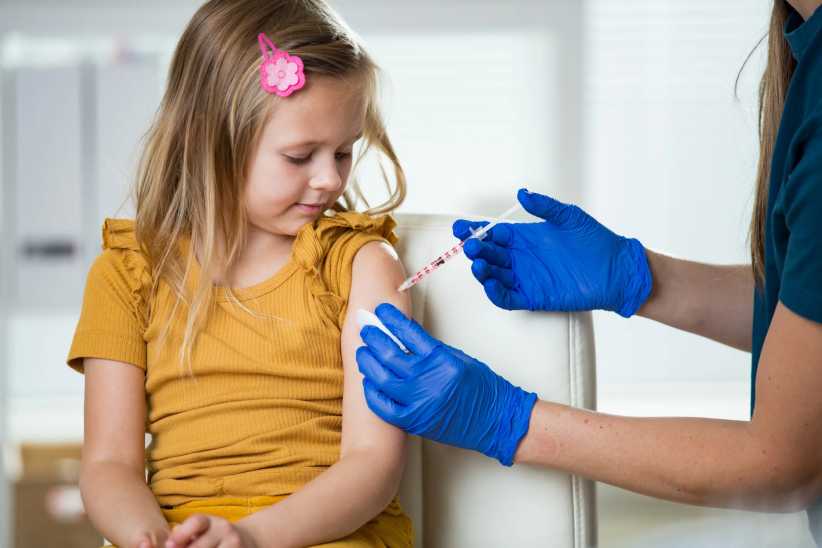
Surgeon General Shares New Warning: Parents are Too Stressed Out
This just in: parents are STRESSED OUT. What a newsflash, right?
Well, according to the latest warning from the U.S. Surgeon General, the amount of pressure American parents are under is actually a cause for national concern, one that warrants immediate action.
Being a parent in 2024 comes with an entirely new set of challenges. Today, parents have to navigate the complexities of social media, their children’s loneliness, their own feelings of isolation, fears about sending children to school, and a lack of community support, not to mention the stressors all adults face with health, finances, and just surviving each day. The Surgeon General’s Advisory focuses on the challenges faced by parents and caregivers and how it can all affect their mental health.
When it comes to support, the advisory shared by Surgeon General Dr. Vivek Murthy is broken down into sections of support systems:
- What National, Territorial, State, Local, and Tribal Governments Can Do
- What Employers Can Do
- What Communities, Community Organizations, and Schools Can Do
- What Health and Social Service Systems and Professionals Can Do
- What Researchers Can Do
- What Family and Friends Can Do
- What Parents and Caregivers Can Do
What National, Territorial, State, Local, and Tribal Governments Can Do
The advisory recommends increased funding for programs supporting parents, caregivers, and families. It emphasizes policies that focus on childcare subsidies, universal preschool, and early childhood education programs. One of the most important points made is the need for a national paid family and medical leave program that offers families the time they need to care for family matters, which also falls into the point that’s made about addressing the financial barriers that many parents face. On a local level, governments are asked to create more communal spaces that offer a sense of community. These are spaces where parents can engage with one another, build their own support, and feel safe.
What Employers Can Do
Employers are being asked to support the well-being of parents and caregivers in the workplace by offering paid leave, flexible work schedules, and access to childcare, as well as training managers on stress management and work-life balance. The advisory states that employers should provide access to comprehensive and affordable mental health care through health insurance plans and confidential counseling services.
What Communities, Community Organizations, and Schools Can Do
Community care is vital for parents and families to thrive. There is a need for having open dialogues, providing resources, and fostering social connections to address parental stress. Community members and organizations are also significant supports in reducing stigma and helping parents and caregivers as they can provide families with resources and essential information. Another important way communities can know what parents and caregivers need is by involving them in shaping community programs and implementing school-based support initiatives.
What Health and Social Service Systems and Professionals Can Do
Health and social systems should prioritize mental health and preventive care for parents and caregivers, focusing on stress management, mental health education, and trauma-informed care. The advisory suggests early screenings for mental health conditions and referrals to supportive resources while collaborating with community organizations to offer support.
What Researchers Can Do
This section emphasizes the need for research to understand, prevent, and improve mental health in parents and caregivers. It highlights essential methodologies, qualitative research, involving diverse populations, and developing effective strategies and interventions. It also stresses research that will help in addressing barriers to mental health care access.
What Family and Friends Can Do
Families and friends are our closest and most immediate community. The support they provide is just as important as any other system. The advisory suggests offering practical support to parents and caregivers to reduce the impact of stress. It encourages regular communication, engagement with empathy without judgment, and remaining vigilant about mental health challenges that the parents in our communities face. Sometimes, parents are just looking for someone to check in, and while these acts seem small, they make a huge difference.
What Parents and Caregivers Can Do
For parents and caregivers, self-care is essential. Parents should engage in stress-reducing activities, set healthy boundaries, seek support from others, have access to comprehensive insurance, and educate themselves about mental health.
As the saying goes, mental health is mental wealth, and it’s not something to take lightly. For many, there is still a major stigma surrounding the topic of mental health and simply asking for help. But, not being able to care for oneself and relieve daily stressors can hurt us in the long run. It’s proven that ongoing stress can impact our health and well-being. The American Psychological Association states that “the long-term activation of the stress response system and the overexposure to cortisol and other stress hormones that come with it can disrupt almost all of your body’s processes.“
The article continues, “This can put you at increased risk for a variety of physical and mental health problems, including anxiety, depression, digestive issues, headaches, muscle tension and pain, heart disease, heart attack, high blood pressure, stroke, sleep problems, weight gain, and memory and concentration impairment.” In short, while the stress parents feel has seemingly become normalized, parental stress is absolutely something that needs to be addressed.
A Mental Health Expert Weighs In
We had the opportunity to speak to a mental health expert on the topic. We asked a few questions about these pressures and how parents can begin to ease some of these daily stressors today. Justin A. Di Lalla (he/him) is a social worker and HIV counselor at a hospital in the Bronx. Justin completed his graduate studies at Fordham University and strongly advocates for mental health accessibility, LGBTQ+ rights, and social justice.
What are the common signs of parental stress, and how can one identify them early?
A vital tool to address the stress caused by parental challenges is the ability to recognize the signs and symptoms of said stress. The most common include increased irritability, fatigue, changes in sleep patterns, and diminished participation in social activities. For the more severe cases, parents may also exhibit signs of anxiety or depression, such as persistent worry or difficulty concentrating. Identifying these signs early involves identifying changes in one’s behavioral pattern, emotional state, and overall well-being. Early recognition and open communication about these stressors can help in seeking appropriate guidance and support.
How can parents set healthy boundaries to prevent burnout?
Parents can set healthy boundaries by clearly defining their limitations regarding time, energy, and commitments. Prioritizing self-care is a crucial component in allowing parents to identify their limits and feel confident in expressing them. It’s important that parents surround themselves with a supportive community made of friends, family, and neighbors who are willing to provide assistance when and however possible. However, we know how difficult this can be for many parents who do not have a co-parent, supportive community, or knowledge on how to prioritize self-care. For this reason, change needs to happen at all levels of our society to make sure parents have the support and guidance that they need.
What are some effective coping strategies for managing stress while balancing work and family life?
Interestingly enough, setting healthy boundaries is, without a doubt, an effective coping strategy for managing stress as a parent. In many instances, coping strategies can be defined as emotion-focused, solution-focused, or some combination of both. Some emotion-focused coping strategies include taking a walk in a quiet area like a park, practicing mindfulness—which can include meditation—and participating in positive self-talk or affirmations. Solution-focused coping strategies include the healthy boundary setting we spoke about, creating to-do lists and delegating responsibilities, and, for those experiencing a more debilitating form of stress, seeking a therapist or counselor to assist in identifying and managing parent’s stress.
The Surgeon General’s Advisory highlights the importance of health and social service systems in cultivating a culture where parents and caregivers can thrive. Do you agree with what is being asked of these systems, and would you suggest any additional support?
Yes, I agree with the Surgeon General’s assessment and recommendation. Unfortunately, the solutions we tend to provide community members with, including parents, are bandaid-type of solutions; they focus on the immediate problem and not the root cause. Health and social service systems need to be more integrated and person-centered. For too long, these systems have worked in silos, which tends to negatively impact those most marginalized in our communities. Hospital systems, community organizations, and governmental entities need to work together to establish an integrated and cohesive path for parents and non-parents to receive the support that they need while also dismantling any barriers that might get in the way.
What resources or support systems do you recommend for parents dealing with chronic stress?
There are many supportive resources throughout the NYC and Westchester County area that can be utilized by parents. In Westchester, some of the resources include: Family Ties of Westchester, The Arc Westchester, Family Services of Westchester, and Westchester Jewish Community Services (WJCS). In NYC, some of the organizations that can provide support are Astor Services, Cardinal McCloskey Community Services, and the Bronx Health Link.
Parents are heading out into the world and experiencing incredible pressures, so much so that the U.S. Surgeon General had to issue an advisory. These pressures require and deserve a village. Understanding that this job can’t be done alone is the first step in some significant changes. There’s a glimmer of hope with VP Kamala Harris’ plan for a $6,000 child tax credit for families during the first year of a child’s life and VP candidate JD Vance also supporting expanding the child tax credit. It’s clear that our systems need some significant changes; until then, parents will continue doing this stressful job and making it look easy.
Psst… check out The Age of Sponsored Content & What Parents Need to Know














